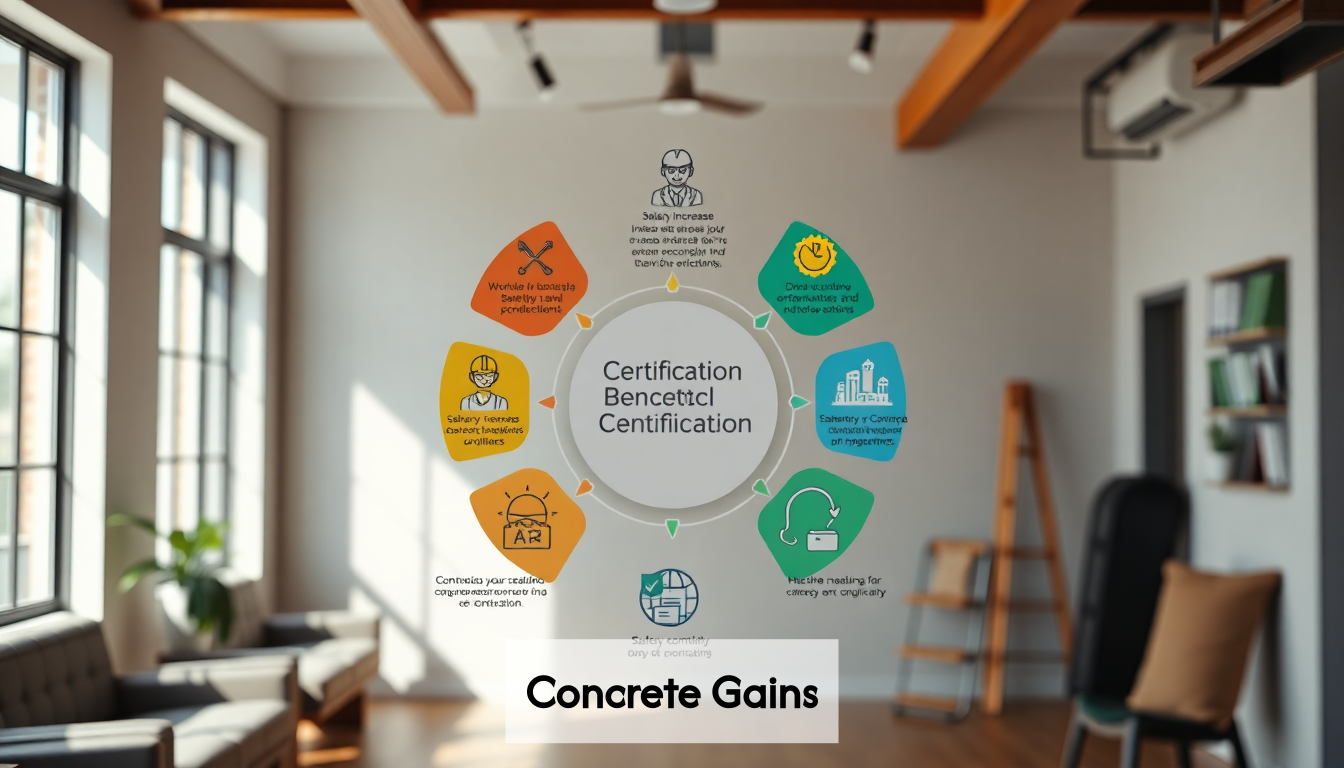The Value Proposition: Why Certifications Matter in Construction
In today’s competitive construction industry, professional certifications have become career-defining assets that distinguish skilled professionals from the crowd. Construction certifications provide verifiable proof of specialized knowledge and competencies that employers and clients increasingly demand.
Construction industry certifications deliver tangible benefits that directly impact your career trajectory:
- Enhanced employability: 93% of hiring managers consider industry certifications when evaluating candidates for construction positions
- Increased earning potential: Certified construction professionals earn 15-20% more than their non-certified counterparts
- Greater project responsibilities: Certification holders are typically entrusted with more complex and higher-value projects
- Risk reduction for employers: Certified professionals demonstrate commitment to safety standards and quality benchmarks
According to the Lean Construction Institute, high-performing teams understand that certifications help professionals deliver greater value by focusing on “the project’s broader impact on the owner’s business, community, and end-users, incorporating quality and safety” beyond just completing basic tasks.
Whether you’re seeking certifications for construction workers at entry-level or advanced professional construction certifications to elevate your management credentials, investing in industry-recognized programs positions you as a dedicated professional committed to excellence in construction practices.
Key Takeaways
| Takeaway | Explanation |
|---|---|
| Certifications Enhance Career Value | Certifications serve as proof of specialized knowledge and can significantly boost employability, leading to better job opportunities. |
| Increased Earnings Through Certification | Certified professionals typically earn 15-20% more than their non-certified counterparts, making certification a financially beneficial investment. |
| Responsibilities and Trust | Holding a certification often leads to more complex project responsibilities and instills greater trust in clients, especially for independent contractors. |
| Safety and Quality Commitment | Certification demonstrates a commitment to safety standards and quality benchmarks, which can reduce risks for employers. |
| Evolving Landscape | The certification landscape is evolving to address new industry trends such as sustainability and digital construction, making continual education critical. |

Exploring Must-Have Construction Certification Programs
The construction industry offers numerous certification pathways that align with various career objectives and specializations. Selecting the right certification program can significantly impact your professional trajectory and marketability in this competitive field.
According to research from industry experts, the most sought-after construction certifications combine industry recognition with practical skill development that addresses emerging trends in technology, sustainability, and safety in the modern construction landscape.
Here are the construction certifications that consistently deliver the strongest return on investment:
- OSHA Outreach Training (10/30 Hour): Foundation-level safety certification required on most commercial sites; an essential certification for construction workers at all levels
- Project Management Professional (PMP): Premier credential for construction management professionals, resulting in 20% higher average salaries for certified practitioners
- Leadership in Energy and Environmental Design (LEED): Increasingly mandatory for government contracts and sustainability-focused projects
- Certified Construction Manager (CCM): Advanced professional construction certification that validates comprehensive management capabilities
- American Concrete Institute (ACI) Certification: Specialized technical certification that demonstrates mastery in concrete construction techniques
Beyond these core programs, specialized certifications in construction technology (BIM), heavy equipment operation, and residential construction certifications provide targeted credentials that address specific industry niches. The certification landscape continues evolving, with new programs emerging to address industry demands for digital competencies and sustainable building practices.
Benefits of Top Construction Certifications for Career Advancement

Construction certifications deliver concrete advantages that directly translate to career progression and professional recognition. Acquiring industry-recognized credentials creates measurable impacts on your marketability, compensation, and job prospects in the construction sector.
Pursuing certifications for construction professionals yields several significant benefits:
- Salary premium: Certified construction professionals command 15-25% higher salaries than non-certified peers with similar experience levels
- Expanded job opportunities: Certifications open doors to specialized roles that remain closed to uncredentialed workers
- Competitive advantage: In hiring scenarios with similarly qualified candidates, certification often becomes the deciding factor
- Client confidence: Certified professionals inspire greater trust, particularly valuable for independent contractors and consultants
- Regulatory compliance: Many construction roles now require certification to meet increasingly stringent regulatory standards
According to Trusscore, construction certifications “demonstrate expertise, increase job opportunities, ensure compliance and safety, enhance credibility, and lead to career advancement” through higher pay, promotions, and access to more complex projects.
Employers value construction certifications particularly for their ability to reduce liability risks while ensuring consistent quality standards across projects. For construction workers seeking certification, these programs represent a structured pathway to demonstrate commitment to professional excellence and continuous skill development. The investment in obtaining these credentials consistently delivers strong returns through enhanced career mobility and earning potential.
Navigating Certification Requirements: Exam Prep, Accreditation, and Selection
Successfully obtaining construction certifications requires strategic planning and thorough preparation. Understanding the specific requirements for each credential is essential before investing time and resources into your certification journey.
Most professional construction certifications follow a structured path that includes:
- Prerequisites verification: Documenting required education, work experience, or prior certifications
- Application submission: Completing formal applications with supporting documentation
- Exam preparation: Studying required materials through self-study or formal training programs
- Examination: Completing knowledge assessments through written, practical, or computer-based testing
- Continuing education: Maintaining credentials through ongoing professional development
When selecting construction industry certifications, prioritize programs with strong industry recognition and accreditation. Legitimate certifications are typically offered by established professional organizations, accredited educational institutions, or government agencies.
The preparation intensity varies significantly across certification types. While some easy construction certifications like OSHA-10 require minimal preparation, advanced credentials like the Project Management Professional (PMP) certification demand substantial study time. According to Husson University, certifications involve “meeting predetermined criteria, passing rigorous exams, and sometimes ongoing requirements” indicating a higher level of expertise than basic certificate programs.
Many certification bodies offer structured study materials, practice exams, and training programs specifically designed to prepare candidates for success. Investing in comprehensive exam preparation resources significantly increases pass rates for most construction certifications.
Future Trends in Construction Certification and Industry Innovation
The construction certification landscape is rapidly evolving to address emerging industry demands and technological advancements. Construction professionals must anticipate certification trends that align with the industry’s future direction to maintain competitive advantage.
Key developments reshaping construction certifications include:
- Digital construction credentials: BIM (Building Information Modeling) certification programs are experiencing 300% growth as digital modeling becomes standard practice
- Sustainability specializations: With nearly half of construction professionals expecting most projects to be environmentally sustainable by year’s end, green building certifications have become essential rather than optional
- Technology integration competencies: Certifications focused on construction automation, robotics, and AI implementation are emerging as these technologies transform jobsites
- Modular and prefabrication expertise: Specialized certifications for off-site construction methods reflect the industry shift toward manufacturing-style production
- Resilient construction practices: New certification programs addressing climate adaptation and disaster-resistant building techniques are gaining prominence
These certification trends directly mirror broader construction industry innovations. As labor shortages persist, certifications for construction workers will increasingly incorporate technology proficiency alongside traditional skills. The most valuable certifications in construction will be those that balance fundamental knowledge with adaptability to emerging methods.
Forward-thinking construction professionals should pursue credentials that demonstrate both mastery of current practices and readiness for industry evolution. This balanced approach ensures certification investments deliver long-term career value despite rapid industry transformation.
Frequently Asked Questions
What are the benefits of obtaining construction certifications?
Obtaining construction certifications enhances career value, increases earning potential, opens up job opportunities, provides a competitive advantage, and demonstrates a commitment to safety and quality standards.
Which construction certifications are considered essential for career advancement?
Essential construction certifications include OSHA Outreach Training, Project Management Professional (PMP), Leadership in Energy and Environmental Design (LEED), Certified Construction Manager (CCM), and American Concrete Institute (ACI) Certification.
How do I prepare for construction certification exams?
To prepare for construction certification exams, verify prerequisites, submit applications, study required materials through self-study or formal training, and review practice exams. Many certification bodies provide structured study resources.
What are the emerging trends in construction certifications?
Emerging trends in construction certifications include digital construction credentials like BIM, sustainability specializations, technology integration competencies, modular construction expertise, and resilient construction practices.
Unlock Your Potential: Elevate Your Career in Construction
Are you feeling the pressure of standing out in the crowded construction job market? With the value of industry-recognized certifications highlighted in our recent article, it’s clear that taking your career to the next level requires more than hard work—it demands strategic positioning and robust networking.
But how do you bridge the gap between certification and job placement? That’s where The Amundson Group steps in. We’re not just a recruitment platform; we are your partners in career advancement, connecting certified professionals with top-tier opportunities in sectors like heavy civil, commercial, and multi-family construction.
Take action now: Leverage your certifications today! Our tailored job placement services are designed to match your newly acquired skills with the right employers who value them. Don’t leave your career to chance—discover how we can help you land your dream role. Visit Amundson Group and start your journey towards a successful construction career today!






